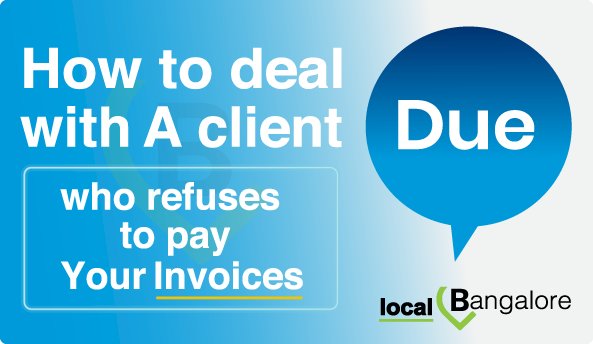How To Deal With A Client Who Refuses To Pay Your Invoices!!
As a small business owner, you’ve most likely come up against difficult clients who, for one reason or another, have refused to pay your invoices.

As a small business owner, you’ve most likely come up against difficult clients who, for one reason or another, have refused to pay your invoices. It’s an unfortunate, yet all-too-familiar, occurrence within the business world.
To make matters worse, many small business owners are often unsure of how to deal with difficult clients who refuse to make payment. Instead of pushing the matter further, they resign themselves to the loss of cash flow. If you find yourself in a similar situation, then you need to know that giving up isn’t your only option. Here are some tips to help you collect outstanding money from your clients.
Send An Email
Our first piece of advice is to get in contact with the client as soon as they miss their payment. Many small business owners worry that they might upset their customers by asking for money. But, as long as you’ve given your client sufficient time to pay their invoices, then sending a polite reminder isn’t entirely unreasonable. You’ve done the work, so you shouldn’t hesitate to ask for what you’re owed.
You can start by sending them a friendly email reminding them that their invoice is past due and asking when you can expect to receive payment. At this point, the most important thing to do is to give your client the benefit of the doubt. They’re human, after all. There’s a chance that they may have simply lost the invoice in their inbox or forgotten to make the payment due to extenuating circumstances. Remember: a little kindness can go a long way.
Contact The Client Directly
If, after a few weeks, you still haven’t received payment, then you should give your client a phone call.
When calling about an outstanding payment, always insist on speaking directly with the person in charge of paying the invoices. You want to speak with someone who can take immediate action to remedy the situation. Likewise, during the conversation, be polite and cooperative, but also be persistent. Make it clear that you’re willing to stay on the line for however long it will take to resolve the issue. Being proactive in these early stages is important if you want to give yourself the best chance of receiving payment.
Give Them Options
There are many reasons why your client may have refused to pay you. Perhaps they don’t have the funds to make payment. Or maybe they weren’t satisfied with your services.
Either way, the best thing to do in this situation is to try to win your client over with kindness. As the saying goes: you catch more flies with honey than vinegar. So, let the customer know that you’re willing to make concessions for them. Emphasise how much you value their business and that you would be happy to renegotiate the invoice’s payment terms to better suit their current situation.
If your client currently doesn’t have the funds, then offer to set up a payment plan. Getting paid eventually is better than not getting paid at all. Alternatively, if they’re dissatisfied with your service, offer to do the work again. At the end of the day, your focus should be on salvaging the business relationship and trying to resolve the situation in a friendly manner.
Send A Letter Of Demand
Of course, sometimes you can’t resolve the situation in a friendly manner. Some clients are just too difficult. In these cases, you may need to adopt a more aggressive approach to get paid. One way to do this is to send them a letter of demand.
A letter of demand is usually sent as the final reminder before you consider taking legal action. It should inform the client of the amount owed, notify them of the new payment deadline, and include a formal warning that legal action may have to be taken if the invoice is not paid. Sending a letter of demand can be surprisingly effective. Often, the threat of legal action is enough to trigger a prompt payment
Seek Legal Action
If you’ve exhausted all your options and still haven’t received payment, then it might finally be time to call in the lawyers. However, mark our words: this should be your last resort. Legal proceedings are often a long and drawn-out process. Pursuing court action may involve spending more time, money and energy than the invoice is worth.
So, before you pursue legal action, weigh your options carefully. Sometimes, the best course of action is to simply let the client go and refuse to work with them again.


 Sam Nile
Sam Nile 










